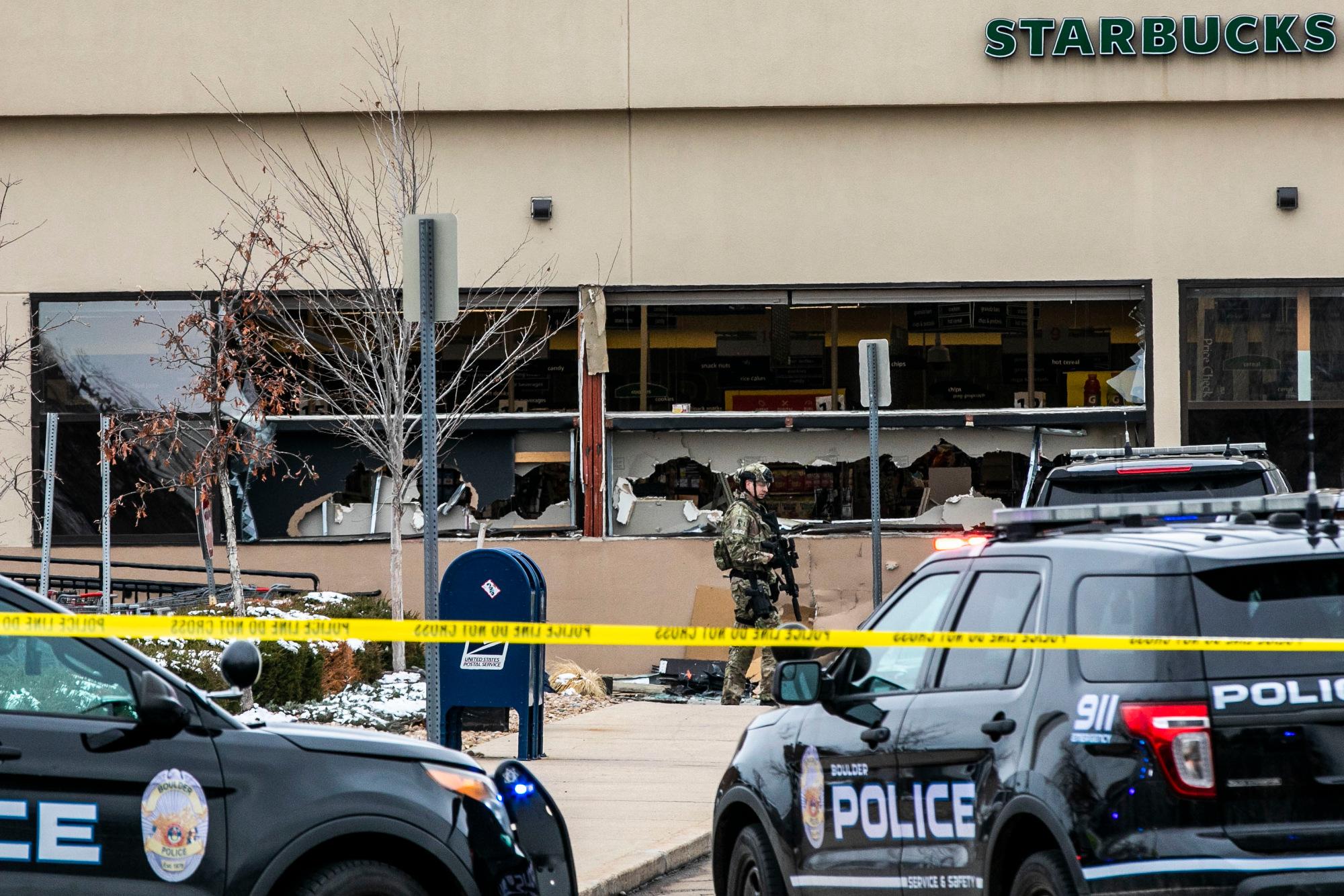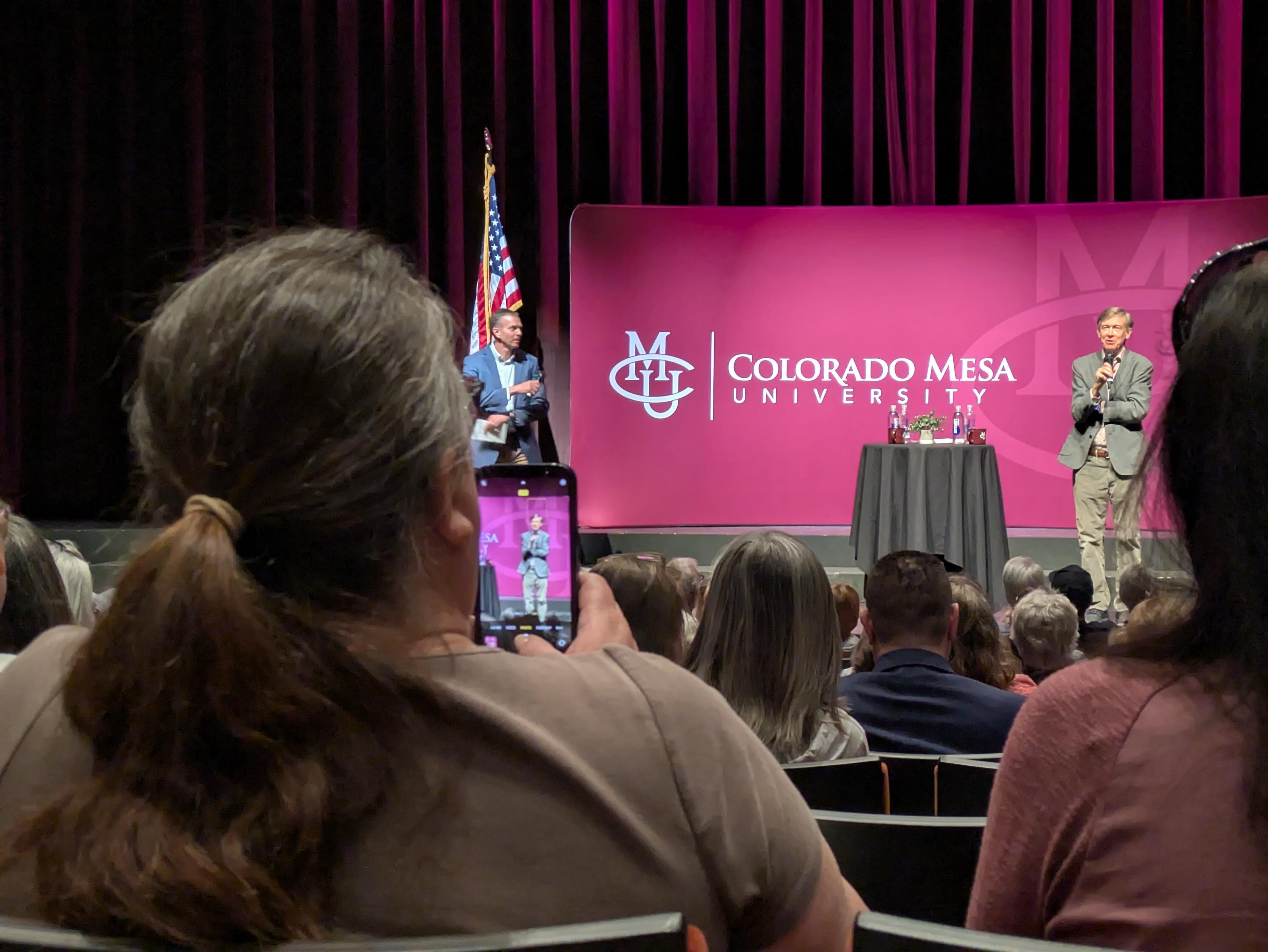
CPR is covering the King Soopers shooting trial. You can read our explainer of the case here. You can read previous coverage of the case here.
Family members of the 25-year-old man accused of killing 10 people at a Boulder grocery store say he had a fairly typical immigrant upbringing in Denver and the western suburbs, but that after high school his behavior began to dramatically change.
Before graduating from Arvada West High School in 2018, Ahmad Alissa, who was born in Syria, was mostly polite and kind to his family, his parents and siblings told a Boulder jury this week. He was bullied because of his name and religion, his father said, but at the time, he talked to his parents about it. He was on the wrestling team. He graduated on time, but two sisters and one brother said when he was a senior, he started to cut off most of his friends.
He enrolled at the University of Colorado Denver and then a community college but he never attended a class at either place.
Ahmad Alissa now faces more than 100 charges for opening fire at a King Soopers store on March 22, 2021, and killing 10 people, including a Boulder police officer. He has pleaded not guilty by reason of insanity.
The alleged gunman apparently told authorities he didn’t go to classes because his parents didn’t allow it, but his parents say they never prohibited him from going to school.
Regardless, after high school, Alissa, who lived in the family’s Arvada home, grew quieter, paranoid and isolated. He went to the gym a lot. He increasingly spent more time online and he worked six days a week in the kitchen at one of the family's Middle Eastern restaurants in Arvada.
Speaking through an Arabic translator in court, his father, Moustafa Alissa, told a jury that he tried to get his son interested in the family business and at first he initially showed some interest, but he eventually stopped engaging.
“In the beginning he was dealing with the conversations … but it changed,” Moustafa Alissa said.
Instead, Ahmad Alissa started telling family members he was afraid he was being followed.
His mother, Khadija Alhidid, also speaking through a translator, said he told her he thought people were chasing him.
“He would say, people are chasing me, the FBI are chasing me,” she told the jury. “I would tell him, my son, we don’t have anything or any issues with anyone, but he would say, the FBIs are chasing me. I don’t know what they want.”
His father echoed this sentiment, telling the jury that Alissa put tape on his telephone because he told his father that people were watching him through his phone.
“At one time, he broke the car key because he said there's a chip inside the car key,” Moustafa Alissa said. “These people are trying to listen to me, really they are. And also to track my location and come and kill me … My reaction, I said he's crazy. I mean who is he?”
The sentiments, which at times were emotional on the stand, are the first public statements from the alleged gunman’s family three and a half years after the mass shooting. It pulled back the curtain on Alissa’s immigrant upbringing: the eighth of 10 kids, some born abroad, some born in the United States, family moves back and forth from Syria, multiple high schools and a hard-working, religious family somewhat isolated in a very large house in Arvada running restaurants.
But in hours of direct examination and cross examination of his parents and two of his siblings, it became apparent that they ignored multiple alarm bells that Ahmad, who lived with multiple siblings in the family home, was not mentally well and was somewhat openly building up an arsenal of weapons and bomb-making chemicals in his bedroom.
At the time, his family chalked it up to Alissa perhaps being possessed by a jinn, an Arabic term translated to like having demons inside, they said in testimony.
“Well, you learned he had a machine gun as you described it, right?” Boulder District Attorney Michael Dougherty pressed Moustafa Alissa, his father.
“Machine gun, yes, but I did not see it,” the defendant’s father said.
“You didn't call the police to take it?” Dougherty said.
Moustafa Alissa responded, “He bought it legally and he had a license. Tell the police what?”
Dougherty replied, “Tell the police that he's possessed by a spirit and that he's insane and perhaps they should come get the machine gun. You didn't make that call … Isn’t it actually true that the reason you didn’t take the gun away or seek to take the gun away is because he was fully functional at the time?”
Moustafa Alissa said, “He was not normal, but we did not expect him to do what he did. We knew he was not normal, but what he did, we did not expect it.”
As immigrants, Alissa’s father said they were worried they would be shunned within their community if they sought medical help for Ahmad.
“It's shameful in our culture, if we say that our son is crazy, it is going to have negative feedback in our community,” Moustafa Alissa said on the stand. “And also we were thinking probably, and this is just our background and our culture, we thought probably he was possessed by a spirit or something.”
Family members all testified that Ahmad’s condition deteriorated after the COVID-19 pandemic.
They kept a few of the restaurants running during the months after the lockdown and the entire family was sickened with the virus in November 2020, they said. Apparently, that is when Ahmad grew even more mentally ill, he gained weight, he lost his hair, he grew a beard, and he began not following a proper hygiene routine.
“His cheeks got chubbier,” his father said. “ And he became more isolated. He stopped completely meeting with us.”
The night before the Monday afternoon shooting was an Arabic Mother’s Day celebration in the family home. His sister told investigators back in 2021 he acted normally that night within the large group and played with her kids.
Ahmad even offered to serve his sister a second dessert, she said to investigators at the time.
The next morning, the day of the shooting, Ahmad Alissa’s mother prepared him breakfast and when he came down to the table, she remarked that he looked like “a homeless person,” his mother and his brother said to the jury.
“So I said, Ahmad, dear, why you are like this? Go shave or get a haircut. If you don't have money, I'll give you $20,” she said to the jury. “He said, that's what you want? I said, yes. We … went shopping and he stayed home and he was supposed to go to the barber.”
In these several years of being in custody, Alissa has refused all visitors, both in jail and at the state mental health hospital, his doctor testified. So his family told the jury that they haven’t seen him since March 2021.
In cross examinations, DA Dougherty often caught the multiple family members who testified in inconsistencies between what they said on the stand this week and what they told investigators in the days after the shooting in March 2021.
He particularly homed in on why no one alerted any authorities about Ahmad Alissa’s possessions of an assault rifle and guns while they watched him mentally deteriorate.
One of Ahmad’s brothers, Mohamad, initially told the Boulder jury that he only saw his brother with a gun right before the King Soopers shooting when he was banging a jammed gun in his bedroom and it made a loud sound.
But Dougherty read a text message Mohamad sent to his best friend about six weeks before the shooting with photos of he and his brother’s guns, including an assault rifle.
“You said you didn't have any concerns,” Dougherty pressed him. “You just thought your brother had picked up a new hobby. Is that right?”
“Yes,” Mohamad Alissa replied, “because he had gone to the gun range and everything was closing down because of Covid. So I thought it was just a hobby that he was picking up.”
Dougherty quipped, “it's your testimony now that at the time he was not capable of making decisions at all?”
Mohamad Alissa said, “yeah, I would say he was not mentally capable.”
“But at the time you knew he had guns and you didn't take any steps to take them away?” Dougherty said.
“We knew that he was sick, he had something wrong, but we don't know what it was,” Mohamad Alissa said.
Dougherty also asked every single family member if Alissa knew right from wrong the day of the shooting.
Alissa’s older sister, Aziza, began crying.
“Do you remember telling investigators that your brother knew it was wrong to kill?” Dougherty asked.
“Maybe I told investigators what occurred was wrong,” she said. “I don’t know. I’m not in his mind.”
- Boulder King Soopers Shooting Trial: Survivor testifies suspected gunman shouted ‘this is fun’ while shooting
- Boulder King Soopers Shooting Trial Day 1: Prosecutors say suspect knew what he was doing; defense describes long struggle with mental illness
- Opening statements start tomorrow for defendant in Boulder King Soopers shooting
- Man accused of killing 10 at King Soopers was ‘sane’ on the day of the 2021 Boulder shooting, evaluators say
- Trial set for man accused of killing 10 at King Soopers
- Accused Boulder King Soopers shooter pleads not guilty by reason of insanity









